Christmas and New Years Eve in Medellin is boring if you don’t have friends or family in the city.
Having been raised in Southern California (lived there for 28 years), Decembers were always fun. My family is Colombian, so I was no stranger to bunuelos, natilla, novenas, and lechona in December. Regardless, when I got here to Medellin seven years ago I was very pleasantly surprised as to how much Paisas love the holiday season.
My first December here in Medellin was pretty boring. I went to a couple hostel Christmas parties and that was it. I didn’t have any family here, nor did I have many Paisa friends. So be warned, if you’re a tourist in Medellin, don’t expect wild clubbing around Christmas or New Year’s Eve.
After a year in Medellin, in 2011, I had made a bunch of friends and that December was amazing. Every December from then on has been full of wild drinking, dancing, eating, 2-day parties, and other unmentionable acts.
Today, I don’t do much partying (focused on my business and purchasing real estate); regardless, I’m going to list out some of my favorite things to do in Medellin in December.
11. Shopping Downtown
First of all, if you don’t like crowds, noise and air pollution, then skip this one. Otherwise, if you’re looking for great deals, then going downtown is the best. You can pretty much find anything in el centro de Medellin. Earlier I wrote a guide to going downtown in half a day. From clothes to souveneirs, you’ll find it all. This year I went downtown to buy all of our office Christmas decorations and office party supplies. It’s much better than going to Exito or the mall.
10. La Alborada
Paisas have a particular way of celebrating the arrival of December. At 12:00 am on December 1st the whole city lights up with fireworks for a good 15 to 30 minutes. This is kind of a morbid tradition since it was imposed by a paramilitary leader in 2003. On November 25th of that year, “Don Berna” and 800 members of his paramilitary group demobilized, and, as a way of celebrating their reincorporation in society, but also to let everyone know that they were still in charge even if they didn’t have any arms, they lit fireworks in different areas of the city. People liked it, and most of them had no idea what it really meant, so it became a tradition.
Today, almost 15 years later, there are mixed feelings about the celebration. Some think it’s not right to celebrate a tradition imposed by a criminal group. Others oppose the firework extravaganza because of the harm it does to pets. The excessive amount of noise has harmful effects on animals and there are always people who get burned from lighting fireworks the wrong way. The Alborada tradition isn’t as strong as it was a few years ago. Still, if you want to see the city light up, you can go to one of the viewpoints around the city, the most popular being Las Palmas, where there’s usually a big crowd. That is, of course, if you don’t live in at an apartment with a great view.
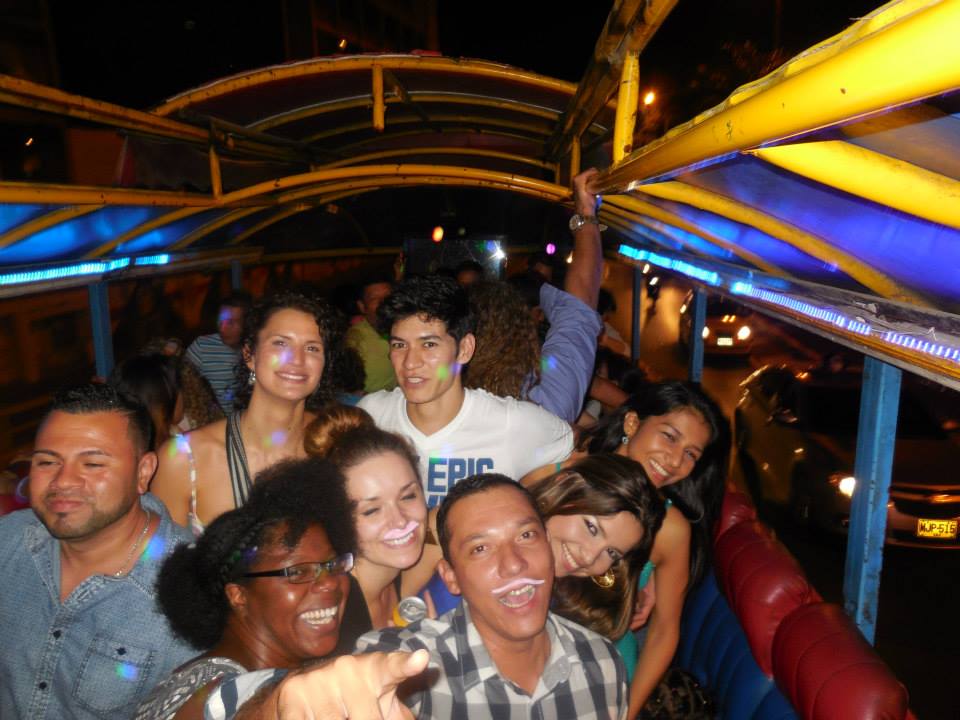
9. Party Chivas
A chiva is a colorful, traditional Colombian bus which used to be the best means of transportation in rural zones of the country and still is in some areas. It has no doors or windows, and it has wooden benches that open to the sides. In the back, it has a ladder to the roof, where they carry luggage and products, and in many cases, people. The first chiva was built in the early XX century, and throughout the years they became a part of Colombian culture. Chivas are no longer used in major cities for transportation. Instead, they have become a novelty. Chivas are now moving dance clubs, and they are particularly popular during December.
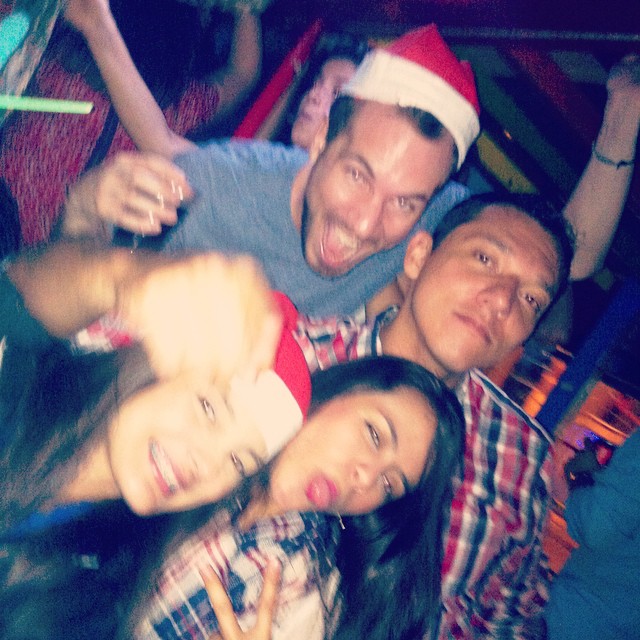
Instead of the wooden benches they now usually have seats in the front, back and on the sides. In the middle, there is a dance floor and a couple of stripper poles. Depending on the size of the chiva, they fit around 30 to 50 people. The first time I rode a chiva it cost $25,000 pesos, which included unlimited aguardiente. My first impression was it was way too small to fit 30 people or more, but, magically, it did. It left from Parque del Poblado at around 10 p.m making stops at Pueblito Paisa, the river to see the lights, Envigado, and Sabaneta. At 2 a.m we were back in Parque del Poblado. If you’re a tall person like me, you’ll hate it, till you get drunk enough to not care about bumping your head for four hours.
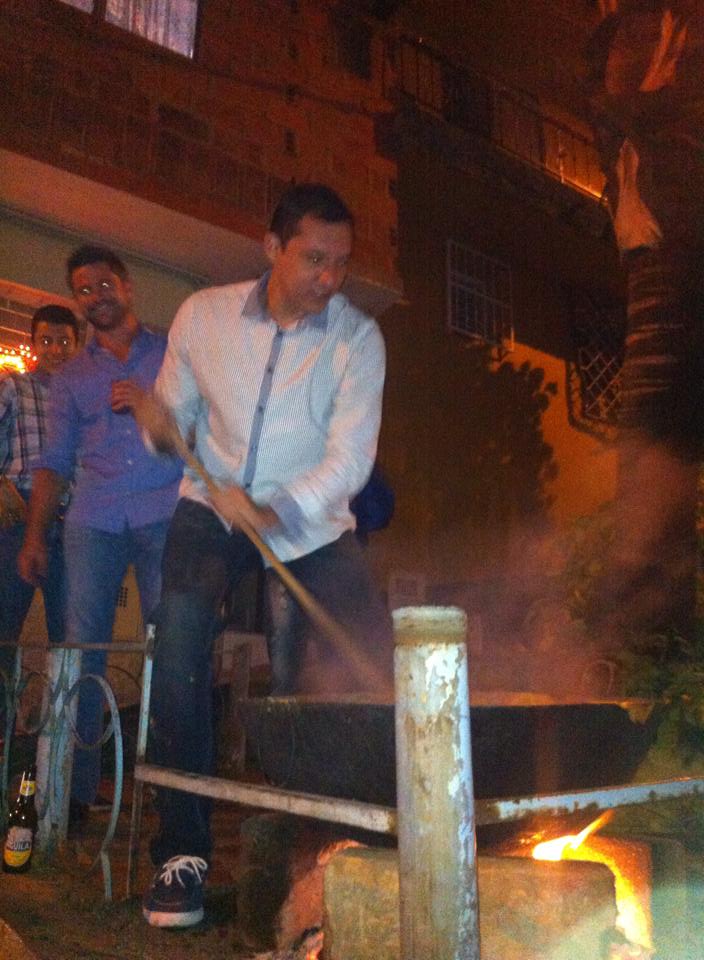
Making Natilla on the street at a house party in Manrique.
8. Eating Traditional Christmas Food – Fattie Heaven
Most Colombian Christmas celebrations include a lot of food and booze. My diet pretty much goes out the window come December. The most popular dish at Christmas celebrations in Medellin is sancocho, which is not particularly a Christmas food, but it is definitely one of the most traditional foods in Colombia. It is a stew which contains pork, beef or chicken (sometimes all three), potatoes, yuca (cassava), plantains, corn on the cob, and a side of avocado, rice, arepa and a banana.
My favorite December food is definitely Lechona, which is basically a roast pig stuffed with rice pork and mixed veggies. Accompanied by a good beer. this is a must-have dish.
The most popular Christmas desserts are natilla, buñuelos, and hojuelas. Natilla is a flan-like dessert made with cornmeal, milk and panela. It is served with buñuelos, which are fried balls of cornmeal and cheese and hojuelas, a fried pastry made with flour and eggs covered with sugar. You can find these desserts at most bakeries during the holidays, or you can buy the ingredients at the grocery store and make them yourself.
7. Alumbrados
“Ver Alumbrados” or seeing the Christmas lights is a big tradition in Medellin. Every year EPM (Medellin Public Services company) organizes a huge Christmas lights scenery, which attracts not only paisas but people from all over the country. People usually visit them with family and friends while eating delicious street food and taking pictures with the millions of lights. This year the Alumbrado will be located in Carabobo, next to Parque Explora and Jardín Botánico, in the north of Medellin. Since 2017 marks the 50th anniversary of this tradition, I’m sure we can expect a very special display.
The main squares of neighbor municipalities like Envigado, Itagüí or Sabaneta are also beautifully illuminated during Christmas, and the best thing is, during the holidays, these squares become literally a party. You’ll find music, amazing food, and drinks, so going Christmas light seeing becomes way more fun than expected.
6. Visiting Pueblito Paisa
Pueblito Paisa is located in the top of the Cerro Nutibara, a small mountain in Laureles. It is the replica of a traditional Antioqueño town square: a church, a fountain in the middle of the square, the town hall, and other buildings that imitate the traditional architecture of towns in Antioquia. During Christmas, Pueblito Paisa always has its own Alumbrado. You can get to know what a traditional town looks like, see the Christmas lights, have a beer or a drink, plus eat great food and get an amazing view of the city.
5. Visiting Nearby Towns
If you want to know what an actual traditional Antioqueño town looks like, there are many nearby towns you can visit, which also have their special celebrations during the holidays. The closest one is El Retiro, which is just a few miles east of Medellin, near the airport. I like this one because even though it’s so close to Medellin, it still preserves a lot of the architecture and culture of traditional small towns. Besides, they celebrate what they call Fiestas del Retiro at the end of December, the biggest event in town which features parades, activities for kids, free concerts in the main square every night, and of course, a whole lot of partying.
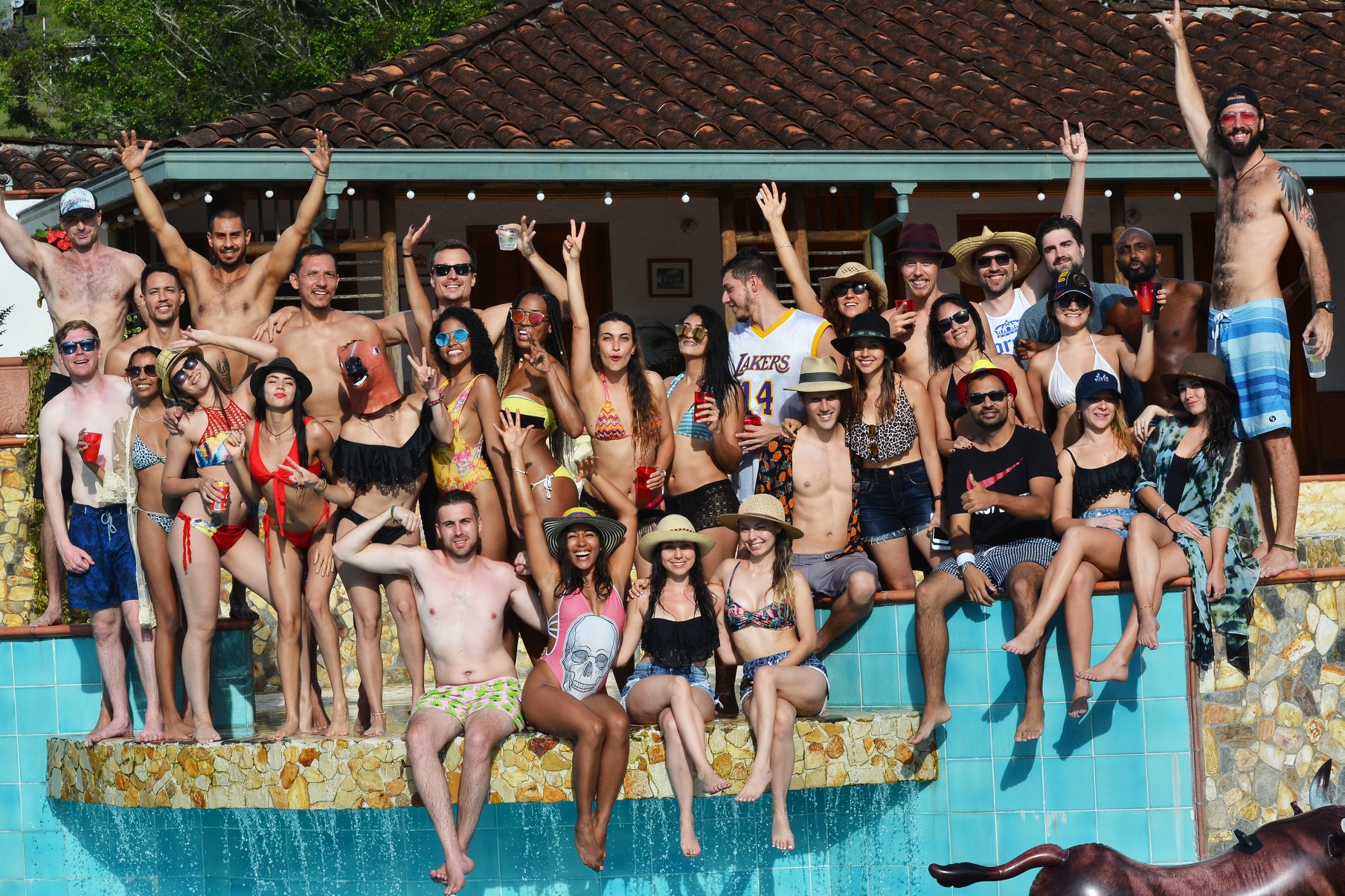
Finca parties are the best!
Another town I really enjoy is Santa Fe de Antioquia, located an hour and a half away by car west of Medellin. I like Santa Fe de Antioquia because of its warm weather, which is perfect for taking a weekend off and spending it by the pool. It’s also a very traditional town and it has preserved colonial culture. It is also very religious, so they have many religious ceremonies during the month, like parades, which are actually very interesting to watch.
Finally, Jardin is my favorite town in Antioquia. It’s a small town in the southwest, Antioquia’s coffee zone, which has become the most touristic town in the department for its coffee and its picturesque architecture. I love coffee, so going to Jardin just to taste different types of artisanal coffee is my kind of trip. But there are many other things to do in Jardin, like going fishing or bathing in natural pools called “charcos”. The main square and its church is mesmerizing, and it looks even more beautiful lit up with Christmas lights.
4. Party at Fondas
A Fonda is a traditional Colombian eating and drinking place. They are particularly popular in Antioquia, since they were the places where arrieros (men who transported all kinds of products through the country in mules) stopped for food and aguardiente, and hanging out with friends and relaxing, during their long journeys. Today they have become nightclubs, and, just like chivas, they become especially popular in December. They preserve traditional stuff from the arrieros days, like decoration and some of them even feature a stable with horses which you can rent and ride for a few minutes. You won’t hear songs in English in a fonda. The music is mostly Colombian and Latino, which means a lot of guasca, vallenato, cumbia, merengue, salsa, bachata, maybe a little bit of reggaeton, and, of course, música parrandera, a genre that becomes popular only in December.
My favorite fonda is Dulce Jesus Mío, located in Las Palmas and on New Year’s Eve they have a big party. There are more good fondas in the same area, or you can find them at Parque Lleras, Laureles, Sabaneta, Envigado, and other areas of the city.
3. Día de las Velitas
The 7th and 8th of December Colombians celebrate Día de las Velitas or Candles Day. This tradition began in the 1800s as a Catholic ritual to honor the Virgin Mary. The 8th of December is the holiday of the Immaculate Conception. Though it began as a religious tradition, it has become a celebration of family and friendship. The activity consists of lighting candles out in the street, or in the balcony, with music and good food to share with family and neighbors. I usually go to a big block party in Buenos Aires (downtown) that a former English student throws. The party lasts all weekend.
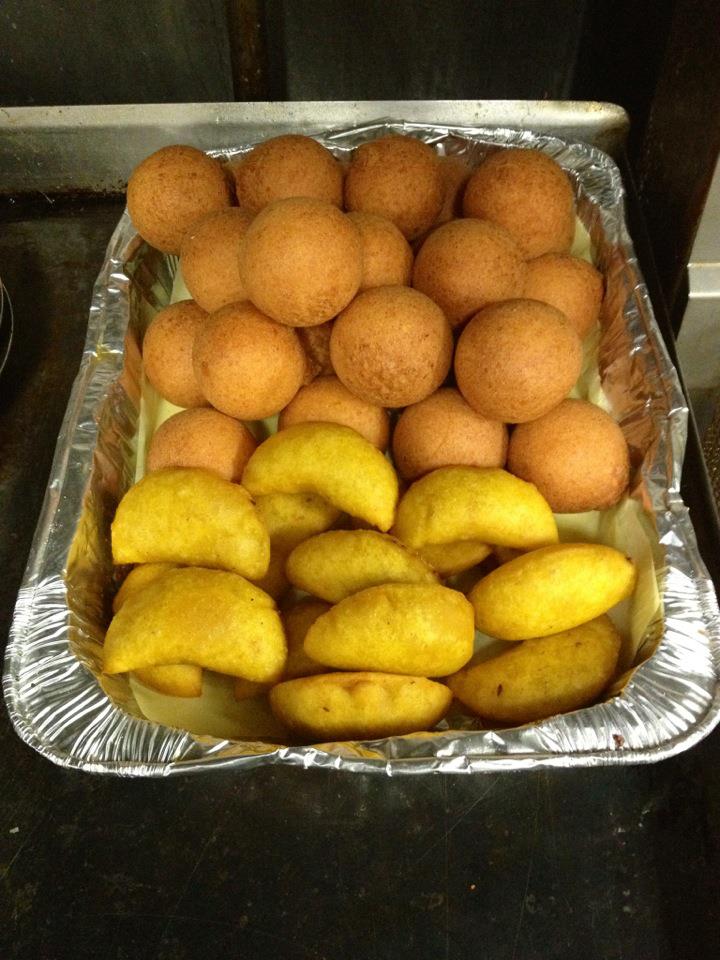
Bunuelos and Empanadas in December in Medellin
2. Family Parties in a Barrio
As I mentioned before, Colombian people love to party and also share with their loved ones. In December, in some neighborhoods of the city, there are endless family parties happening out in the streets, and they mostly consist of families making sancocho out in the sidewalk, drinking aguardiente and dancing to música parrandera. Some families also do a marranada, which consists of killing a pig and cooking all kinds of dishes with its content. Natilla, buñuelos, and hojuelas are also a must during these parties. In some neighborhoods they even close an entire block just so they can have fun in the street without worrying about cars.
These parties are most common on Christmas Eve, and sometimes they last two days straight. You probably won’t find these parties in El Poblado or Laureles, but you most likely will in the Barrios Populares and maybe even in Envigado. If you pass by one of these neighborhoods on Christmas Eve, you will see a huge sancocho pot outside every door in every block.

All nighter till’ the break of dawn. An Aranjuez house party.
1. Doing La Novena
La Novena is a 9-day prayer during the 9 days before Christmas. It is a preparation for the arrival of Baby Jesus, mainly consisting of thanking God, Virgin Mary, and Joseph for bringing Jesus to the world. Although I don’t subscribe to this religion I still like going to novenas because of the food, the social aspect, and the nostalgia. Praying la Novena has become a tradition in most Colombian families, and it is especially fun for the kids since it includes a lot of singing, afterward, it is almost mandatory to have natilla, buñuelos, and hojuelas. In Medellin, there are a lot of communal Novenas, especially in shopping malls, where a lot of people gather up and pray the Novena and usually include singing groups and orchestras that perform Christmas carols. If this sounds like something you’d like to see, you can google “Novenas in Medellin” and you’ll find different places around town where you can attend a Novena.
I love Medellin in December because it’s all about spending time with family and friends. If this is your first time in Medellin during December hurry up and get on Tinder and/or Colombian Cupid and make local friends so you can get invited to local parties!
Happy Holidays!

About the writer – Andrew Macia
Hello, my name is Andrew Macia and the Medellin Buzz is my blog. I moved to Medellin in 2010 and fell in love with the city. I taught advanced level English for four years and then started a digital marketing company.
I love Colombian, and Medellin is my home. I like to write and I want to give back to the community. This is the best way I know how. I hope you enjoy my blog!
About the Medellin Buzz
I started the Medellin Buzz as a resource for my English as a foreign language student. A site where they could read about their city in English, that wasn’t boring. It slowly turned into a personal blog and hub for information for people discovering Medellin. I check comments frequently, so feel free to leave your comment and/or questions below.


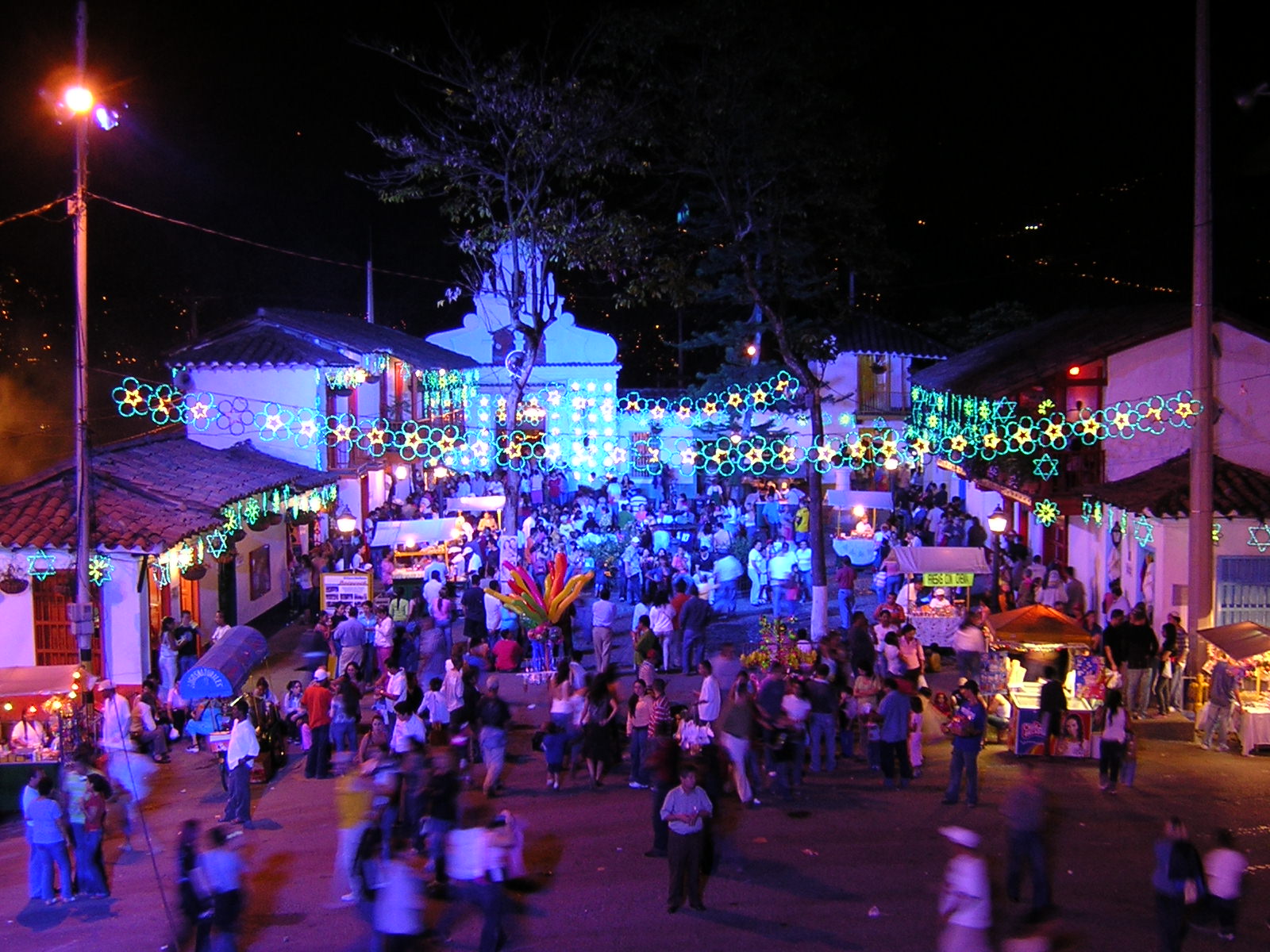
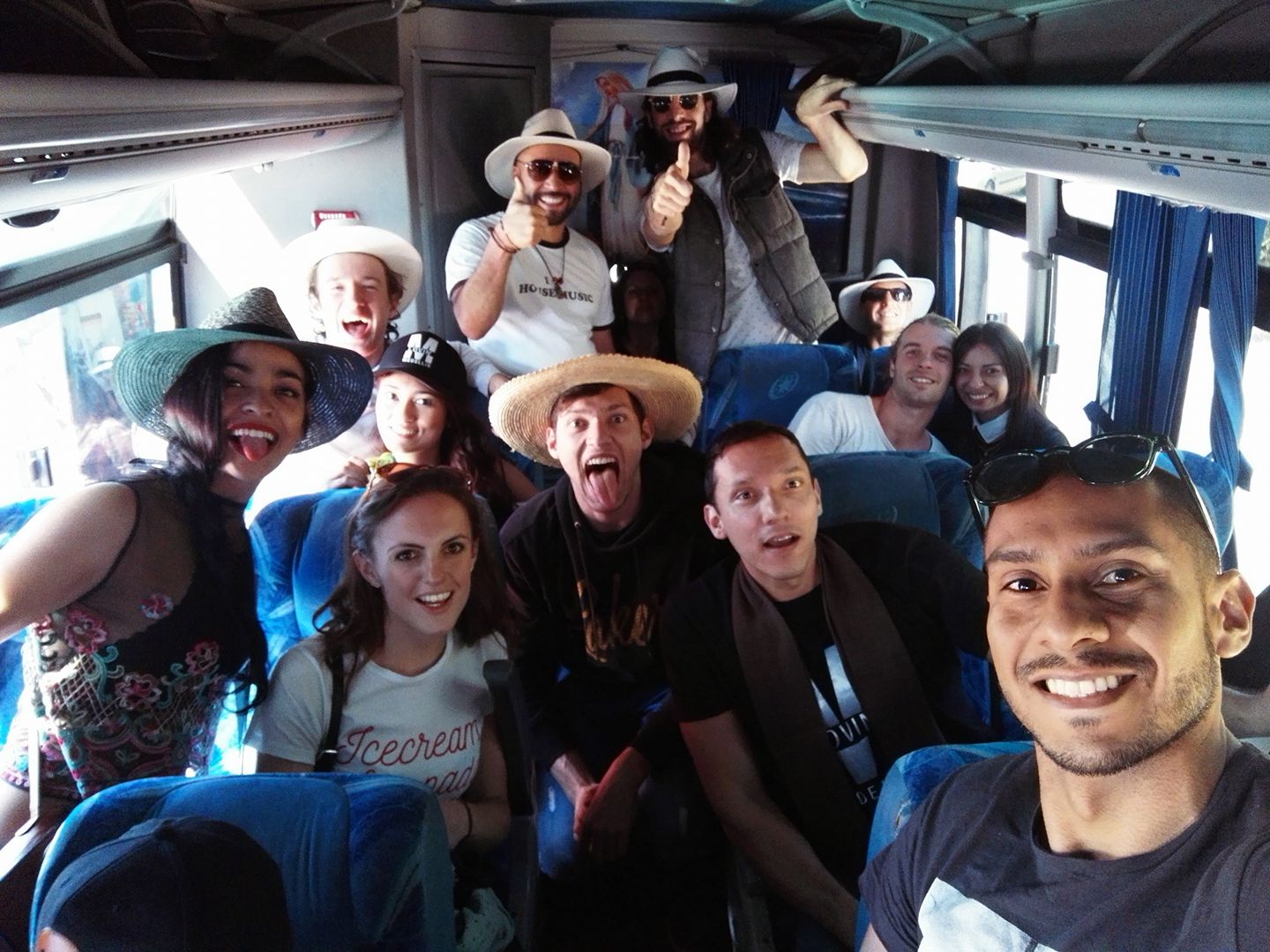
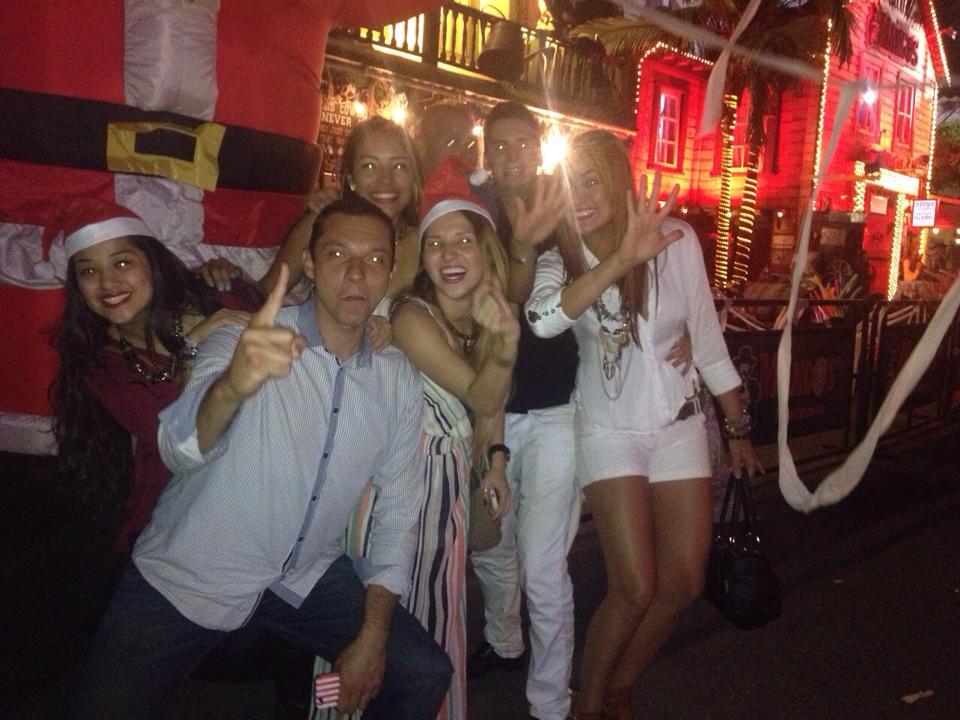
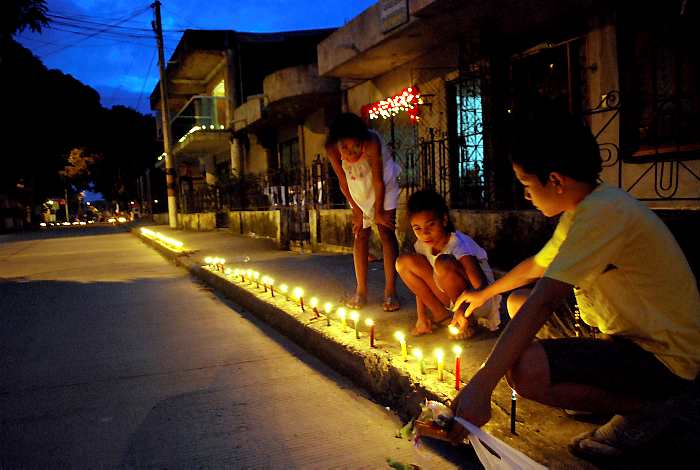
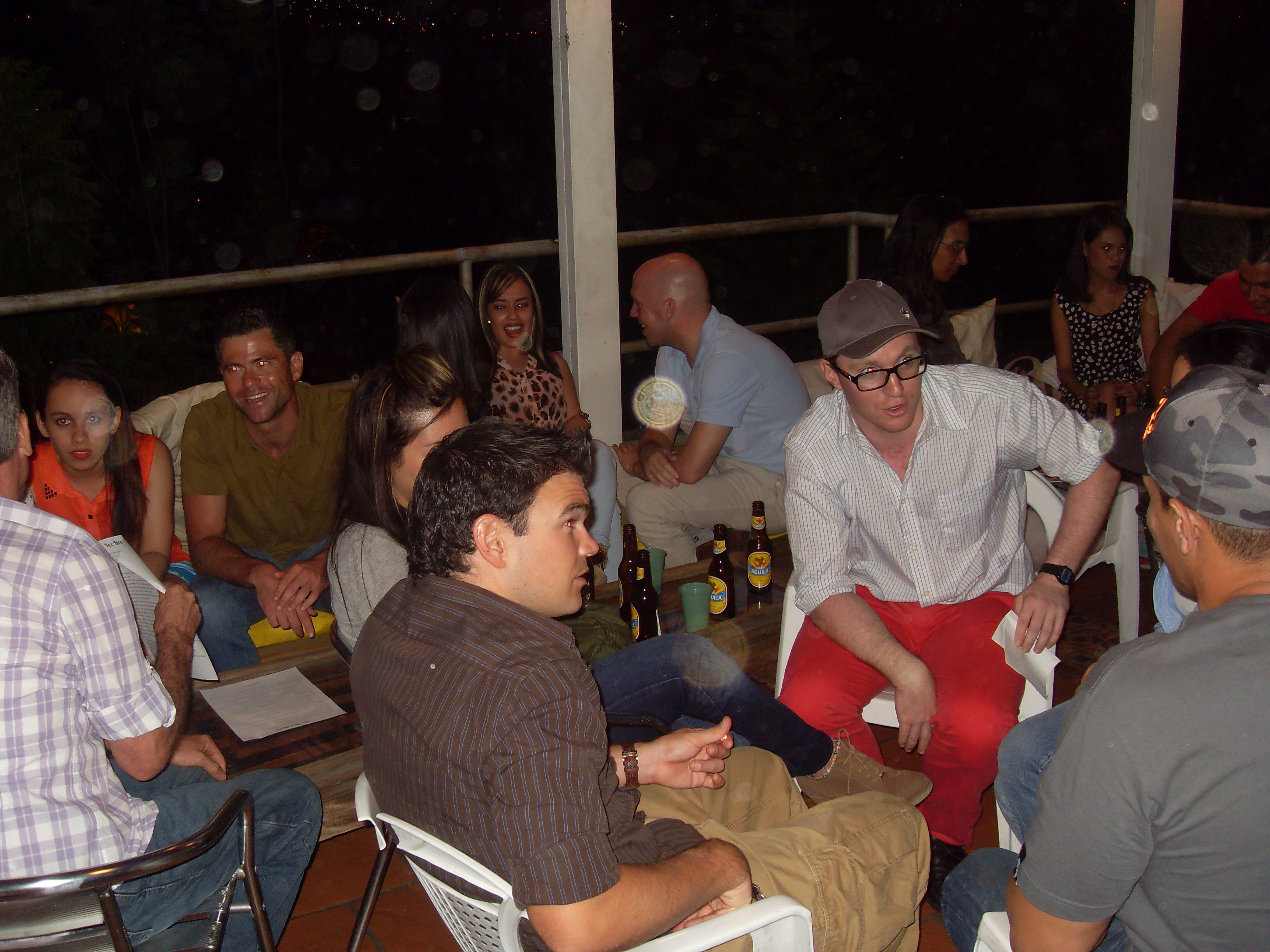
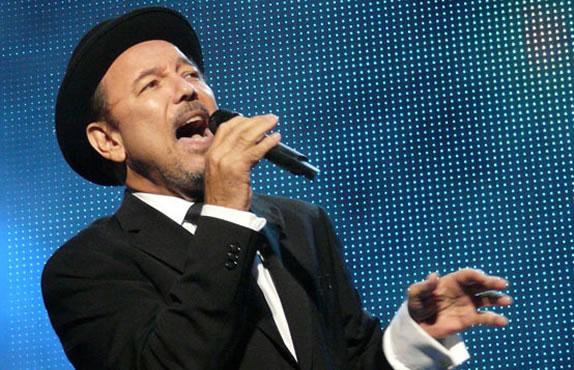

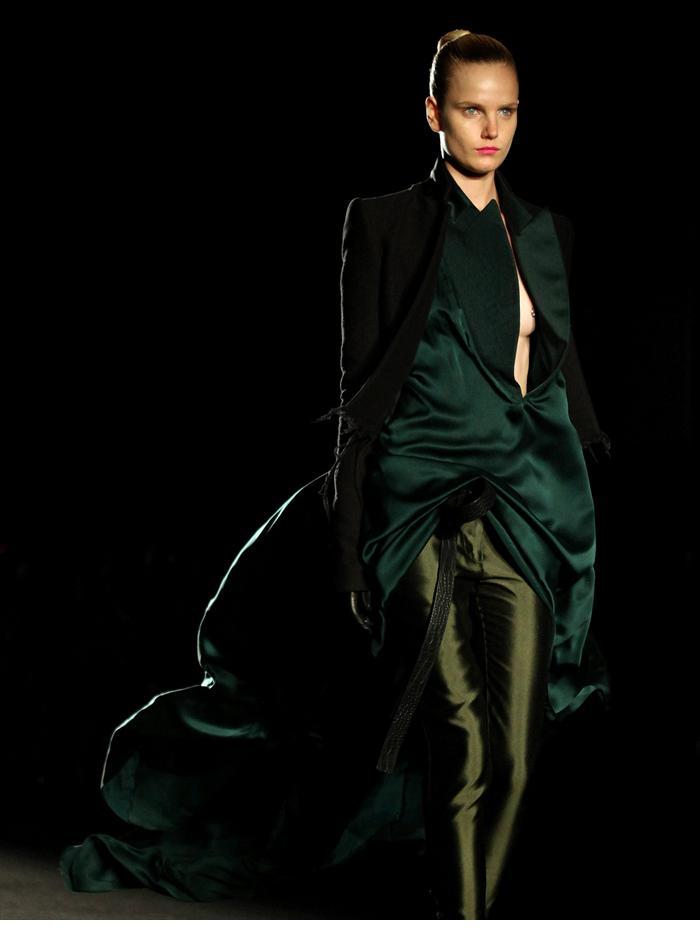

I visited Medellin last May and June and i can not say i was blown away by this city. In fact many expats, felt the need to constantly tell me how dangerous it is. Colombia has the worst education system and there is abstract poverty, was what i was told by many. The government controls the media, and the statistics are not a true reflection of crime rate.
Poblado is so westernised and as for the night life, i don’t see the appeal; hookers every where and a seedy undertone. Many Colombian locals, agree on this, it is soulless. Maybe i went to the wrong places with my colombian companion.
I am returning soon and this time i will try to immerse myself in the local culture, learn more Spanish and try to get a better feel for the city.
Have you got any right ups on football (5 a side); or BJJ clubs?
Hi Richard,
Thanks for the comment. Yeah, Poblado is either hit or miss. Some people love it, some hate it. I live in Poblado in a neighborhood called Manila, and I love it. You should probably look into a place like Laureles, or Envigado.
I don’t do Brazilian Jiu Jitsu, nor do I play football anymore, so I don’t have any thing written on those sports. But there is a BJJ community and of course there are tons of places to play 5 a side football.
Andrew, thank you for your blogs. I have a question. Two of us are seniors and thinking about going to Medellin as we hear the city is very pretty and hospitable. Do you think it is a good choice for seniors question. We would want to stay in a nice area where we felt comfortable walking around. Perhaps go to a museum or two and enjoy some good food and music. Not the music that a 30 year old would enjoy, but something more relaxing
Hi Ray, yes, I think it’s a good idea. Depending on your budget, I’d look into staying near Provenza (above Parque Lleras in the neighborhood of el Poblado), it’s pricy, but it’s where the good restaurants are at and it’s pedestrian. You may want to consider barrio Manila as well (near parque poblado) it’s flat and has good restaurants and cafes. Another good option is the barrio of Conquistadores in Laureles, Ciudad del Rio, and perhaps Envigado. As for museums, there’s no area were there all together. You’ll probably have to take an uber. If you need a contact of an English-speaking driver, I can hook you up with my driver’s number, Osacar. I hope this helps. Cheers.